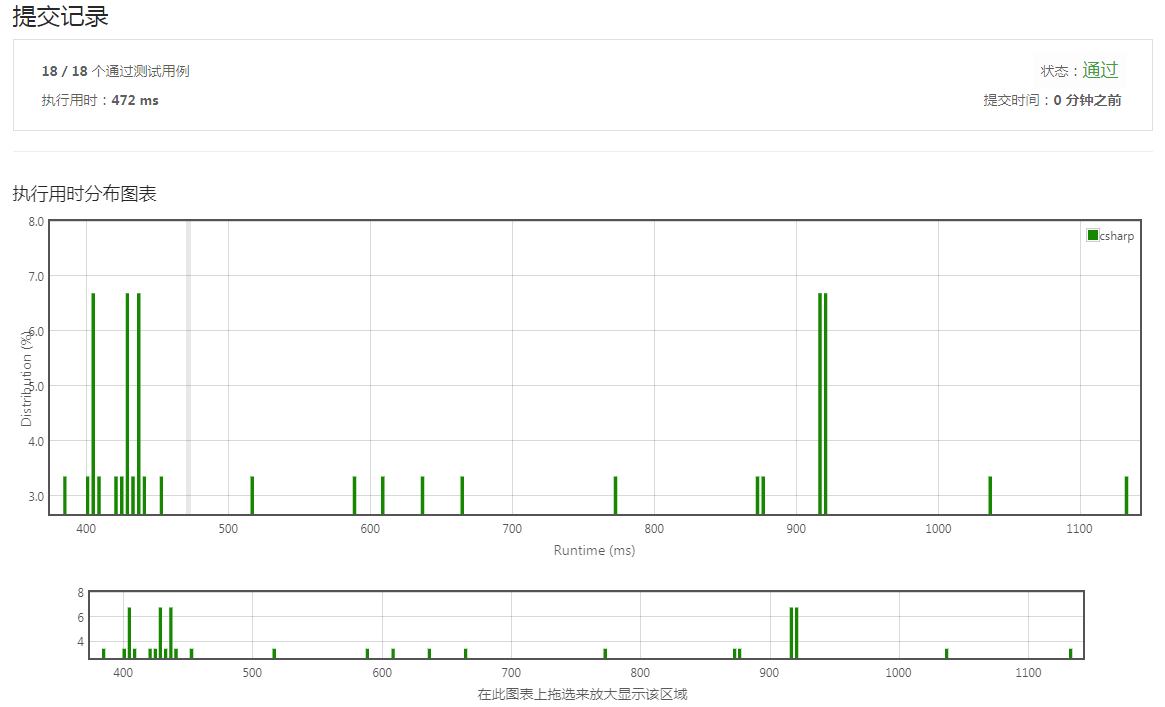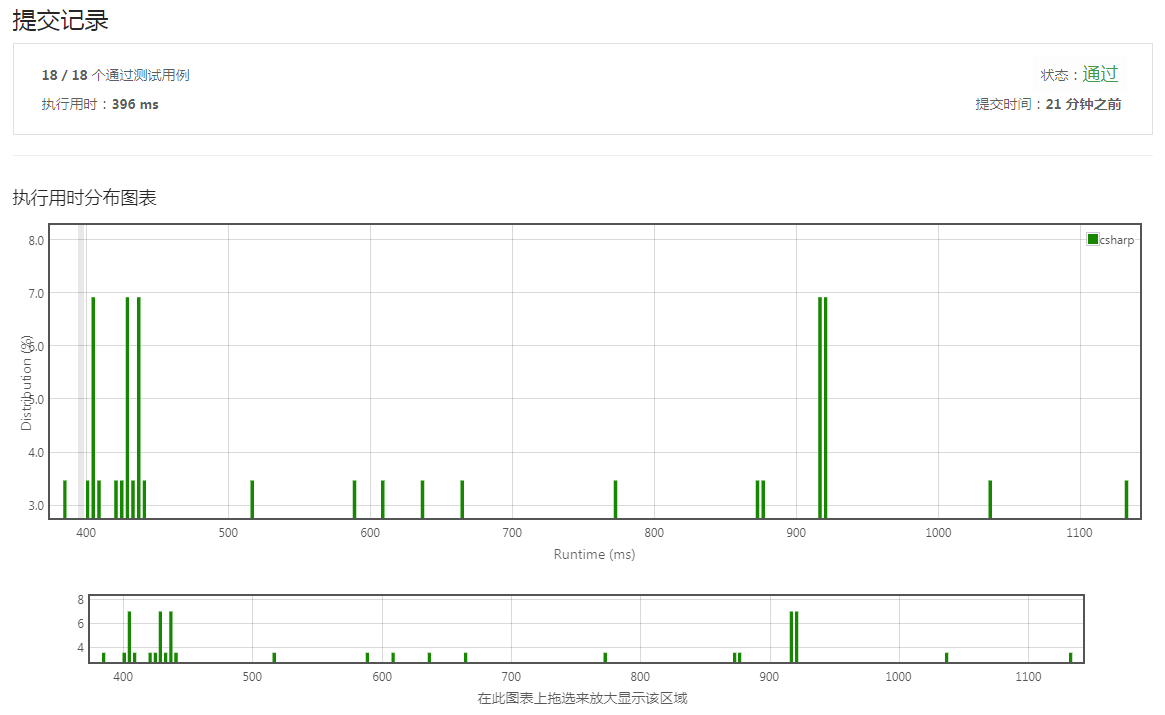Topic English
Given an array nums, there is a sliding window of size k which is moving from the very left of the array to the very right. You can only see the k numbers in the window. Each time the sliding window moves right by one position. Return the max sliding window.
Example:
Input: nums = [1,3,-1,-3,5,3,6,7], and k = 3 Output: [3,3,5,5,6,7] Explanation: Window position Max --------------- ----- [1 3 -1] -3 5 3 6 7 3 1 [3 -1 -3] 5 3 6 7 3 1 3 [-1 -3 5] 3 6 7 5 1 3 -1 [-3 5 3] 6 7 5 1 3 -1 -3 [5 3 6] 7 6 1 3 -1 -3 5 [3 6 7] 7
Note:
You may assume k is always valid, 1 ≤ k ≤ input array's size for non-empty array.
Follow up:
Could you solve it in linear time?
Topic Chinese
Given an array nums, a sliding window of size k moves from the leftmost side of the array to the rightmost side of the array. You can only see k numbers in the sliding window. The sliding window moves one bit to the right at a time.
Returns the maximum value in the sliding window.
Examples:
Input: nums = [1,3,-1,-3,5,3,6,7], and k = 3 Output: [3, 3, 5, 5, 6, 7] Explanation: Maximum position of sliding window --------------- ----- [1 3 -1] -3 5 3 6 7 3 1 [3 -1 -3] 5 3 6 7 3 1 3 [-1 -3 5] 3 6 7 5 1 3 -1 [-3 5 3] 6 7 5 1 3 -1 -3 [5 3 6] 7 6 1 3 -1 -3 5 [3 6 7] 7
Tips:
You can assume that k is always valid. If the input array is not empty, 1 < k < the size of the input array.
Advancement:
Can you solve this problem in linear time complexity?
Algorithmic Implementation
Realization 1: Violence to find the maximum value of each window.
public class Solution { public int[] MaxSlidingWindow(int[] nums, int k) { int len = nums.Length; if (len == 0) return nums; int[] result = new int[len - k + 1]; for (int i = 0; i < result.Length; i++) { result[i] = GetMax(nums, i, i + k); } return result; } public int GetMax(int[] arr,int start,int end) { int max = int.MinValue; for (int i = start; i < end; i++) { if (arr[i] > max) max = arr[i]; } return max; } }
Realization 2: If you want to improve time efficiency, you need to use structure.
Structure of two-way queue
public class MyCircularDeque { private int _pFront; private int _pRear; private readonly int[] _dataset; private int _length; private int _maxSize; /** Initialize your data structure here. Set the size of the deque to be k. */ public MyCircularDeque(int k) { _dataset = new int[k]; _length = 0; _maxSize = k; _pFront = 0; _pRear = 0; } /** Adds an item at the front of Deque. Return true if the operation is successful. */ public bool InsertFront(int value) { if (_length == _maxSize) return false; _pFront = (_pFront - 1 + _maxSize) % _maxSize; _dataset[_pFront] = value; _length++; return true; } /** Adds an item at the rear of Deque. Return true if the operation is successful. */ public bool InsertLast(int value) { if (_length == _maxSize) return false; _dataset[_pRear] = value; _pRear = (_pRear + 1) % _maxSize; _length++; return true; } /** Deletes an item from the front of Deque. Return true if the operation is successful. */ public bool DeleteFront() { if (_length == 0) return false; _pFront = (_pFront + 1) % _maxSize; _length--; return true; } /** Deletes an item from the rear of Deque. Return true if the operation is successful. */ public bool DeleteLast() { if (_length == 0) return false; _pRear = (_pRear - 1 + _maxSize) % _maxSize; _length--; return true; } /** Get the front item from the deque. */ public int GetFront() { if (_length == 0) return -1; return _dataset[_pFront]; } /** Get the last item from the deque. */ public int GetRear() { if (_length == 0) return -1; int index = (_pRear - 1 + _maxSize) % _maxSize; return _dataset[index]; } /** Checks whether the circular deque is empty or not. */ public bool IsEmpty() { return _length == 0; } /** Checks whether the circular deque is full or not. */ public bool IsFull() { return _length == _maxSize; } }
code implementation
public class Solution { public int[] MaxSlidingWindow(int[] nums, int k) { int len = nums.Length; if (len == 0) return nums; int[] result = new int[len - k + 1]; //Array positions that hold the current window maximum ensure that the values of array positions in the queue are sorted from large to small MyCircularDeque deque = new MyCircularDeque(len); for (int i = 0; i < len; i++) { // Guarantee from large to small, if the front number is small, it needs to pop up in turn until it meets the requirements. while (deque.IsEmpty() == false && nums[deque.GetRear()] <= nums[i]) { deque.DeleteLast(); } //Add array subscripts corresponding to the current value deque.InsertLast(i); // Determine whether the value of the current queue leader is valid if (deque.GetFront() <= i - k) { deque.DeleteFront(); } // Save the maximum value in the current window when the window length is k if (i + 1 >= k) { result[i + 1 - k] = nums[deque.GetFront()]; } } return result; } }
experimental result
Achievement 1:
- Status: Through
- 18/18 pass test cases
- Execution time: 472 ms, beating 53.33% of all C # submissions
- Memory consumption: 34.3 MB, beating 50.00% of all C # submissions

Achievement II:
- Status: Through
- 18/18 pass test cases
- Execution time: 412 ms, defeating 82.76% of all C submissions
- Memory consumption: 34.9 MB, beating 10.00% of all C submissions

Relevant pictures and texts:
- LeetCode Actual Warfare: The Sum of Two Numbers
- LeetCode Actual Warfare: Sum of Three Numbers
- LeetCode Actual Warfare: The First Positive Number Missing
- LeetCode Actual Warfare: Solving the Mode
- LeetCode Actual Warfare: Number of Happiness
- LeetCode Actual Warfare: Delete the penultimate N node of the list
- LeetCode Actual Warfare: Merging Two Ordered Lists
- LeetCode Actual Warfare: Merging K Sort Lists
- LeetCode Actual Warfare: Nodes in the Two-to-Two Exchange Link List
- LeetCode Actual Warfare: Rotary Link List
- LeetCode Actual Warfare: Ring List
- LeetCode Actual Warfare: Effective Brackets
- LeetCode Actual Warfare: Longest Effective Brackets
- LeetCode Actual Warfare: Evaluating Inverse Polish Expressions
- LeetCode Actual Warfare: Same Tree
- LeetCode Actual Warfare: Symmetric Binary Tree
- LeetCode Actual Warfare: Maximum Depth of Binary Trees
- LeetCode Actual Warfare: Converting Ordered Arrays to Binary Search Trees
- LeetCode Actual Warfare: Searching for Two-Dimensional Matrix